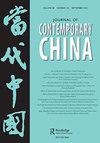发明的边界:中国基层爱国主义与国家领导的爱国运动之间的紧张关系
IF 2.4
2区 社会学
Q1 AREA STUDIES
引用次数: 0
摘要
爱国运动和群众动员利用了公众现有的仇外态度,强化了中国和西方之间“我们vs.他们”的二元论。然而,爱国运动并不总是自上而下的、国家主导的,也不总是主要受政治意识形态的驱动。爱国主义内容吸引了越来越多的民族主义观众,这些人既有被外国侵略戕害的感觉,又有作为中国公民的自豪感。本文认为,在社交媒体上传播的爱国主义内容的盈利能力加剧了市场驱动的基层爱国主义与国家主导的爱国主义运动之间的紧张关系。这种紧张关系产生并表现在围绕经济驱动、草根“爱国”内容的网上流行辩论中,这些内容可以挑战国家主导的爱国言论。虽然国家有时会战略性地将一些爱国主义内容纳入自己的爱国主义叙事中,但它也会通过“高黑”或“低红”等标签使其他不受欢迎的爱国主义内容失去合法性。这些标签最初是用来区分精心制作的政治讽刺和恶搞与不合格、不合逻辑和庸俗的宣传作品,这些宣传作品无意中损害了国家的爱国运动,但后来演变成一种权力的行使,使中共与不受欢迎的爱国内容保持距离。本文章由计算机程序翻译,如有差异,请以英文原文为准。
Invented Borders: The Tension Between Grassroots Patriotism and State-led Patriotic Campaigns in China
ABSTRACT Patriotic campaigns and mass mobilization draw on existing xenophobic attitudes of the public, reinforcing the ‘us vs. them’ dualism between China and ‘the West’. However, patriotic campaigns are not always top-down, state-led, nor are they always primarily driven by political ideology. Patriotic content appeals to a growing nationalist audience who consumes a mixed feeling of perceived victimization at the hand of foreign aggression and the pride arising from being a Chinese citizen. This paper argues that the profitability of patriotic content circulating on social media exacerbated the tension between market-driven grassroots patriotism and state-led patriotic campaigns. The tension grows out of, and is manifested in, the online popular debate around economically driven, grassroots ‘patriotic’ content that can challenge the state state-led patriotic rhetoric. While the state sometimes strategically co-opts some patriotic contents into its own patriotic narratives, it also delegitimises other undesired ones through labels such as ‘high-level black’ (gaoji hei) or ‘low-level red’ (diji hong). These labels were initially used to differentiate meticulously crafted political satire and parody from incompetent, illogical and vulgar propaganda pieces that unintendedly blemish the state’s patriotic campaigns, but later evolved into an exercise of power to distance the CCP from undesired patriotic content.
求助全文
通过发布文献求助,成功后即可免费获取论文全文。
去求助
来源期刊

Journal of Contemporary China
AREA STUDIES-
CiteScore
5.10
自引率
7.70%
发文量
72
期刊介绍:
Journal of Contemporary China is the only English language journal edited in North America that provides exclusive information about contemporary Chinese affairs for scholars, businessmen and government policy-makers. It publishes articles of theoretical and policy research and research notes, as well as book reviews. The journal"s fields of interest include economics, political science, law, culture, literature, business, history, international relations, sociology and other social sciences and humanities.
 求助内容:
求助内容: 应助结果提醒方式:
应助结果提醒方式:


